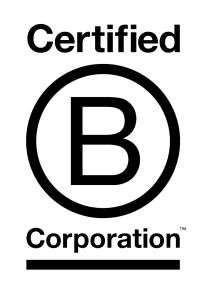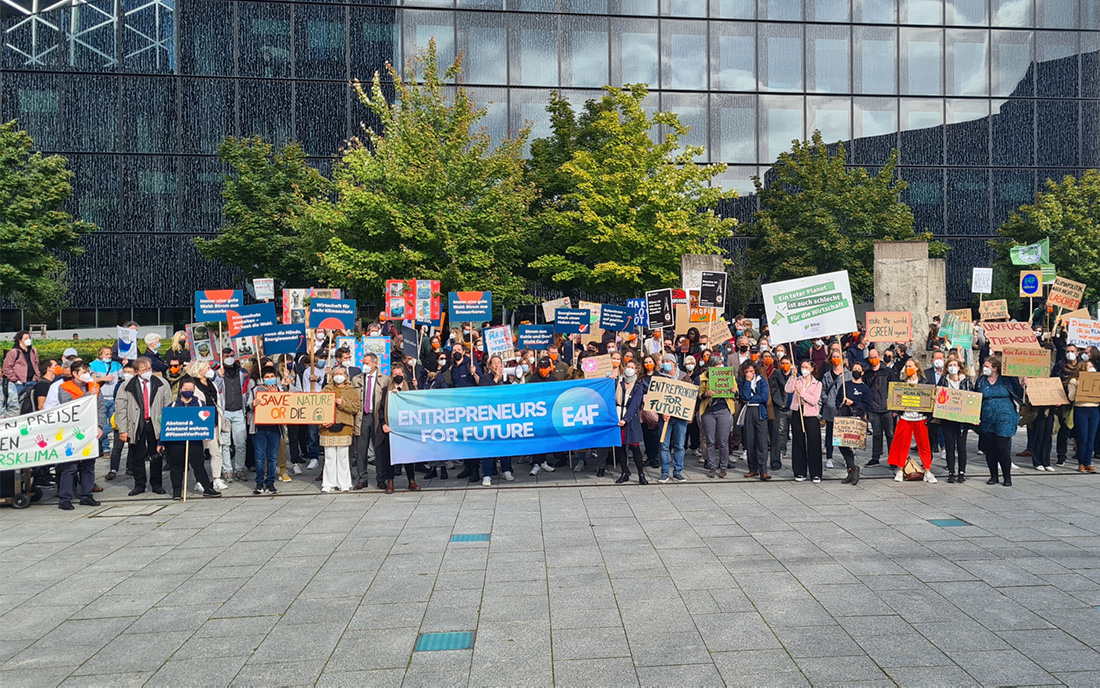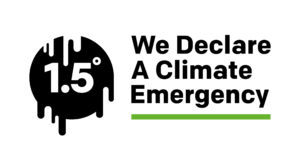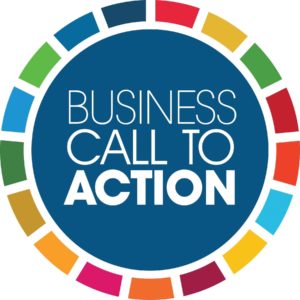These 9 entrepreneurial initiatives unite true sustainability leaders

Unfortunately, Greenwashing is not a rare phenomenon in times of increasing climate awareness. There is also another way: These nine initiatives involve entrepreneurs who are really serious about social responsibility.
The term “greenwashing” is used to describe the attempt by entrepreneurs to create a particularly environmentally friendly and responsible image to the outside world, even though there is no real basis for this. This is achieved, for example, by means of PR measures with misleading content or monetary donations to ecological projects, with which one’s own conscience is to be “washed clean” and distracted from the “dirty” company activities. Especially in the current times, in which the awareness for climate and environmental protection is rapidly increasing, greenwashing providers are unfortunately increasingly mingling with serious sustainable companies. For us consumers, it is not always directly recognizable who is really serious about social responsibility. To get a better overview of sustainable companies, there are fortunately more and more initiatives that collect serious offers. We present 9 initiatives in which entrepreneurs who are more than aware of their social responsibility are involved. First and foremost, these include new or lesser-known initiatives that, in addition to established players such as B.A.U.M. e.V., which has been committed to environmentally conscious management in companies since 1984, or interest groups such as the Bundesverband Nachhaltige Wirtschaft e.V. (Federal Association for Sustainable Business), are now also being supported. (formerly unternehmensgrün) or the Social Entrepreneurship Netzwerk Deutschland (SENA).

Certified B Corporation
The most pressing problems of our time cannot be solved by governments and non-profit organizations alone; private companies must also join in and harness the power of business for good. The Certified B Corporation initiative includes more than 4,000 companies from over 150 industries around the world that are ethically certified. In doing so, the statutes notarize that stakeholder interests are valued equally as important as the economic interests of the owners (shareholders). Certified B-Corp companies, therefore, balance purpose and profit and commit to considering the impact of their business decisions on employees, customers, suppliers, society, and the environment. What is also special is that not only the product or service of a company is evaluated, but also the positive overall effect of the entire company is weighted. The global initiative originated in 2006 in the United States, where three friends had simply had enough of the greedy pursuit of profit maximization by large companies. While the well-known outdoor brand “Patagonia” helped to develop the certification process in the US, we at GOOD helped to set up the German chapter. In the meantime, offshoots of “Certified B Corporation” can be found in almost 80 countries worldwide.

Gemeinwohl-Ökonomie
As with Certified B Corporation, “Gemeinwohl-Ökonomie” (GWÖ for short, in English: Common Good Economy) looks at the company as a whole. The idea is that if only individual products or internal processes are checked and certified, only part of the company is considered. This means that it is not clear how well the company is positioned in terms of governance, in its dealings with employees, the environment, and society. With the Common Good Balance Sheet, consumers get a good overview of the extent to which the company contributes positively to the common good. More than 500 companies have already been certified by GWÖ and have thus declared the well-being of people and the environment to be the primary goal of their business activities. The civic GWO movement was founded in Austria in 2010 and has since spread throughout Europe. In the meantime, players can also be found in Latin American and African countries as well as in the US.
«Our current economic system is upside down. Money has become a self-purpose instead of a means to what really matters: a good life for all.»” Christian Felber, co-initiator and author of the book “Gemeinwohl-Ökonomie”

Purpose Economy
The “Purpose Economy” is still a fairly young but all the more important initiative. This is because, particularly in Germany, there is no legal form for companies that operate in the market and thus pursue an impact-oriented mission. The Purpose Foundation solves this problem by offering companies to acquire a single share in the company and to provide it with voting rights that prevent a “mission shift”. Thus, profits may no longer be paid out (uncapped) to external investors. The company belongs to itself, so to speak, and the founders retain control and later pass it on to their successors, without a financial exit. Behind the Purpose Economy initiative is an international team of entrepreneurs, lawyers, investors, psychologists, and economists who have helped 100 companies transform since its inception.

1% for the Planet
“1% for the Planet” is a global network of people, non-profit organizations, and companies that put people and the planet above profit. This is made possible through the two membership programs, which target both companies and individuals. Companies that join the network commit to donating one percent of their gross sales directly to environmental nonprofits. In addition to financial contributions, donations in kind and advertising support are also eligible, so that the work of the supported environmental organizations is given as wide a reach as possible. The association was launched in 2002 by Yvon Chouinard, founder of Patagonia, and Craig Mathews, founder of Blue Ribbon Flies when the two decided to donate one percent of their sales proceeds to environmental protection. “1% for the Planet” has since grown into a global movement with over $250 million invested in non-profit environmental solutions.

Entrepreneur’s Pledge
Inspired by the philanthropic campaign “The Giving Pledge,” which was founded by billionaires Bill Gates and Warren Buffet to encourage rich people to donate for the common good, the “Entrepreneur’s Pledge” was founded. The focus here is on entrepreneurs who think and act sustainably. As “pledgers,” the entrepreneurs commit to founding at least one company that has a positive impact on ecological and social challenges and reinvest 50 percent of their profits in promoting this cause. Only entrepreneurs with a proven track record of starting a business with at least $1 million in revenue or at least 10 employees are eligible to participate. In addition, each new Pledger must be recommended by 2 existing Pledgers.

Entrepreneurs for Future
The association “Entrepreneurs for Future” emerged from Greta Thunberg’s protest movement “Fridays for Future”. It brings together entrepreneurs who are committed to a climate-friendly economy. More than 5,000 companies have signed the statement so far, which targets an economy in which innovative products, technologies, services, and business models play a central role in advancing rapid climate action. In addition to the statement, the entrepreneurs from the association can also be found regularly at the protests of “Fridays for Future”. Alongside schoolchildren and students, the entrepreneurs protest together for a future worth living.


We Declare A Climate Emergency
On October 8, 2018, the Intergovernmental Panel on Climate Change (IPCC) published what is arguably one of the most important reports on the state of climate science. According to this report, a rise in global temperatures of 1.5 degrees Celsius would have devastating consequences. Everything must be done to further limit emissions and pursue the goal of being CO2-free by 2030. On the website “We Declare A Climate Emergency” you can find logos for free download, with which you can give your own actions a unified identity. According to the initiators, the proclamation is the first step, but it must of course be followed by action to reduce CO2 emissions. The non-profit organization “Business Declares” unites all those entrepreneurs who also take this second step and raise awareness for greater climate and environmental awareness in the corporate sector.

Business Call to Action
As mentioned at the beginning, the private sector is a key player in achieving climate and environmental goals. The United Nations Development Programme (UNDP), through its Business Call to Action initiative, brings together companies that are committed to achieving the 17 Sustainable Development Goals (SDGs). What makes this initiative special is that it only recognizes and promotes inclusive companies that employ people in low- and middle-income markets, include them as part of their core business on a large scale, and thus ensure that they also benefit.

Business Fights Poverty
To drive change at the system level, you have to go beyond traditional boundaries and find new and creative ways to collaborate. How fortunate that our world is more connected than ever. “Business Fights Poverty” is an award-winning global initiative focused entirely on social impact. The Initiators believe in the power of business to improve the lives, livelihoods, and learning opportunities of the most vulnerable people and communities. Together, they are committed to a just and resilient future.


